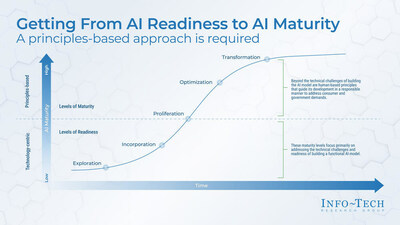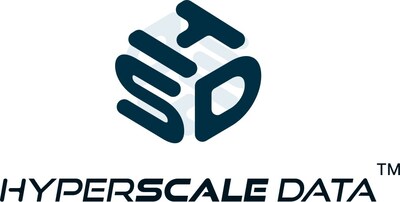Transforming Healthcare With AI: Info-Tech Research Group Reveals Key Steps for Effective Implementation
Press Releases
Sep 15, 2023
In newly published research, the firm highlights the need for a comprehensive review of AI capabilities, including AI governance, data, staff expertise, processes, and technology infrastructure, for effective AI implementation in the healthcare industry.
TORONTO, Sept. 15, 2023 /PRNewswire/ – Artificial intelligence has exciting potential in the healthcare industry with its ability to analyze and interpret large health data sets at scale, transforming them for public health and epidemiologic surveillance. However, the integration of AI in healthcare is not without its challenges, raising ethical and legal concerns about data equity and bias. Although many of these concerns are not unique to AI, the technology introduces novel ethical challenges that extend beyond the purview of traditional regulators and participants in healthcare systems. In response to this situation, Info-Tech Research Group has released its Getting to Automated Surveillance and Location Intelligence in Public Health Practice blueprint to not only address the challenges but also emphasize the power of location intelligence, powered by AI, to revolutionize healthcare decision making.
"Digital technologies and artificial intelligence (AI), particularly machine learning (ML), are transforming medicine, medical research, and public health," says Neal Rosenblatt, principal research director at Info-Tech Research Group. "The use of AI technologies for health has already contributed to advances in fields like drug discovery, genomics, radiology, pathology, and prevention. However, challenges and obstacles to the use of AI for health raise ethical, legal, commercial, and social concerns."
The research blueprint highlights various risks and constraints associated with the application of AI in public health. Among the most pressing concerns is the risk of AI inadvertently exacerbating health disparities, particularly among rural, underprivileged communities as well as in developing regions. Issues such as poor model interpretability further compound these challenges. The lack of AI-specific training within the public health workforce, combined with ongoing ethical and privacy concerns, underscores the need for comprehensive strategies to tackle these challenges.
The research provides a recommended strategy to navigate the complexities associated with integrating AI in the healthcare industry. The strategy includes ensuring that AI tools are created using high-quality data that is representative of the population and that organizations clearly understand their current capacity to implement and manage AI-based applications. The firm also advises that it is essential to remember that upgrading AI capabilities may require organizational changes, as well as integration with governance and risk management programs already in place.
To effectively facilitate the recommended strategy, Info-Tech recommends in the blueprint the following seven steps to getting started with AI in the healthcare industry:
Step 1 – Getting to "Go!": Get ready to start, optimize, and operationalize AI with population health-focused, socially responsible use cases.
Step 2 – Strategize & Govern AI: Start aligning outcomes-focused data strategies and approach AI ethically with attention to equity and bias.
Step 3 – Plan a Proof of Concept: Prioritize and plan the first purpose-driven AI use case.
Step 4 – Architect AI: Build an architecture that effectively supports practical AI.
Step 5 – Select Technology: Select the right tools and technologies.
Step 6 – Develop & Deploy: Design, develop, validate, and deploy AI use cases.
Step 7 – Champion & Communicate: Collaborate, communicate, and co-create AI solutions across the organization.
The firm's blueprint also suggests that healthcare industry leaders should not confine their focus to the technical challenges of constructing the AI model. For effective AI implementation within the industry, it's crucial to evaluate the organization's current state of AI capabilities, considering factors such as AI governance, data quality, skilled personnel, streamlined processes, and the technological infrastructure in place.
To learn more about implementing AI in the healthcare industry, download the complete Getting to Automated Surveillance and Location Intelligence in Public Health Practice blueprint.
For media inquiries on the topic or to get exclusive, timely commentary from Neal Rosenblatt, an expert in public health research, please contact [email protected].
For more information about Info-Tech Research Group or to access the latest research, visit infotech.com and connect via LinkedIn and X.
About Info-Tech Research Group
Info-Tech Research Group is one of the world's leading information technology research and advisory firms, proudly serving over 30,000 IT professionals. The company produces unbiased and highly relevant research to help CIOs and IT leaders make strategic, timely, and well-informed decisions. For 25 years, Info-Tech has partnered closely with IT teams to provide them with everything they need, from actionable tools to analyst guidance, ensuring they deliver measurable results for their organizations.
Media professionals can register for unrestricted access to research across IT, HR, and software and over 200 IT and industry analysts through the firm's Media Insiders program. To gain access, contact [email protected].
![]() View original content to download multimedia:https://www.prnewswire.com/news-releases/transforming-healthcare-with-ai-info-tech-research-group-reveals-key-steps-for-effective-implementation-301929442.html
View original content to download multimedia:https://www.prnewswire.com/news-releases/transforming-healthcare-with-ai-info-tech-research-group-reveals-key-steps-for-effective-implementation-301929442.html
SOURCE Info-Tech Research Group





